
Excertos do catálogo

Implants trauma PROlock Radius Locking Plate 2.0
Abrir o catálogo na página 1
CAUTION: Federal Law (USA) restricts this device to sale by or on the order of a board certified physician. WARNING: If there is no sufficient bone healing, wrong or incomplete postoperative care, plate might break. All ITS plates are preformed anatomically as a matter of principle. If adjustment of the plate to the shape of the bone is required, this is possible by carefully bending gently in one direction once. Particular care is required when bending in the region of a plate hole, as deformation of the plate may lead to a failure of the locking mechanism. The plate must not be buckled or...
Abrir o catálogo na página 2
1. Introduction P. 5 Preface P. 6 Screws P. 7 Properties P. 8 Advanced Properties P. 9 Drill Block P. 10 Indications & Contraindications P. 10 Time of operation 2. Surgical Technique P. 12 Pre-operative patient preparation P. 13 Access P. 13 Implantation P. 21 Postoperative treatment P. 21 Explantation P. 21 Summary 3. Information P. 23 Locking P. 23 Dotize® P. 24 Order list P. 26 Reconditioning Manual
Abrir o catálogo na página 3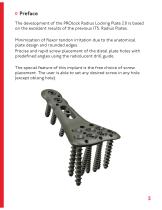
Preface The development of the PROlock Radius Locking Plate 2.0 is based on the excellent results of the previous ITS. Radius Plates. Minimization of flexor tendon irritation due to the anatomical plate design and rounded edges. Precise and rapid screw placement of the distal plate holes with predefined angles using the radiolucent drill guide. The special feature of this implant is the free choice of screw placement. The user is able to set any desired screw in any hole (except oblong hole).
Abrir o catálogo na página 5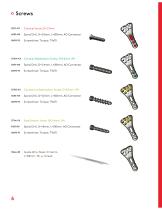
Spiral Drill, D=2.0mm, L=100mm, AO Connector Cortical Stabilization Screw, D=3.0mm, RH Spiral Drill, D=2.4mm, L=100mm, AO Connector Cancellous Stabilization Screw, D=3.0mm, RH Spiral Drill, D=2.0mm, L=100mm, AO Connector Spiral Drill, D=1.8mm, L=100mm, AO Connector Guide Wire, Steel, D=1.6mm, L=150mm, TR, w. thread
Abrir o catálogo na página 6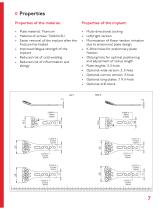
Properties Properties of the material: • Plate material: Titanium • Material of screws: TiAl6V4 ELI • Easier removal of the implant after the fracture has healed • Improved fatigue strength of the implant • Reduced risk of cold welding • Reduced risk of inflammation and allergy • Multi-directional locking • Left/right version • Minimization of flexor tendon irritation due to anatomical plate design • K-Wire holes for preliminary plate fixation • Oblong hole for optimal positioning and adjustment of radius length • Plate lenghts: 3, 5-hole • Optional wide version: 3, 5-hole • Optional narrow...
Abrir o catálogo na página 7
♦ Predefined angles of the distal holes Version left Version right Hole number Direction proximal/distal Direction ulnar/radial
Abrir o catálogo na página 8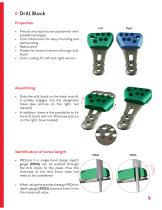
Drill Block Properties: • Precise and rapid screw placement with predefined angles • Click mechanism for easy mounting and dismounting • Radiolucent • Allows for screw insertion through drill block • Color coding for left and right version Assembling: • Slide the drill block to the distal end till it audible engages into the designated holes (see picture on the right, red marked) • In addition, there is the possibility to fix the drill block with a K-Wire (see picture on the right, blue marked) Identification of screw length: • PROlock II in single-hand design depth gauge (59026) can be...
Abrir o catálogo na página 9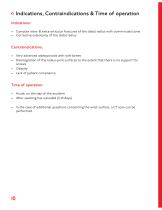
Indications, Contraindications & Time of operation Indications: • Complex intra- & extra-articular fractures of the distal radius with comminuted zone • Corrective osteotomy of the distal radius Contraindications: • Very advanced osteoporosis with soft bones • Disintegration of the radius-joint surfaces to the extent that there is no support for screws • Obesity • Lack of patient compliance Time of operation: • Acute, on the day of the accident • After swelling has subsided (5-10 days) • In the case of additional questions concerning the wrist surface, a CT scan can be performed.
Abrir o catálogo na página 10
Surgical Technique
Abrir o catálogo na página 11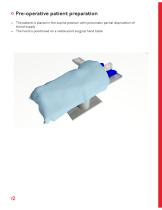
Pre-operative patient preparation • The patient is placed in the supine position with pneumatic partial deprivation of blood supply • The hand is positioned on a radiolucent surgical hand table
Abrir o catálogo na página 12
Access The skin incision is performed on the distal forearm volar, above the tendon of the flexor carpi radialis and reaching to the crease of the wrist (FCR-approach). Split the deep fascia of the forearm. Release the pronator quadratus muscle from the distal radius beginning at the radial edge. Implantation Suspending the thumb with a counterpoise, the fracture is loosened and the length restored. The individual fragments are reduced with the appropriate instrumentation, and, if necessary, the comminuted zones are filled with bone substitute to achieve a provisional reduction in position...
Abrir o catálogo na página 13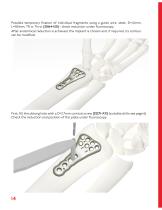
Possible temporary fixation of individual fragments using a guide wire, steel, D=1.6mm, L=150mm, TR w. Thrd. (35164-150) - check reduction under fluoroscopy. After anatomical reduction is achieved, the implant is chosen and, if required, its contour can be modified. First, fill the oblong hole with a D=2.7mm cortical screw (32271-XX) (suitable drills see page 6). Check the reduction and position of the plate under fluoroscopy.
Abrir o catálogo na página 14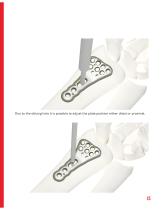
Due to the oblong hole it is possible to adjust the plate position either distal or proximal.
Abrir o catálogo na página 15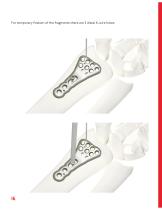
For temporary fixation of the fragments there are 3 distal K-wire holes.
Abrir o catálogo na página 16
Next fill the shaft holes with either D=3.0mm cortical stabilization screws (37304-XX) or with D=2.7mm cortical screws (32271-XX) (suitable drills see page 6).
Abrir o catálogo na página 17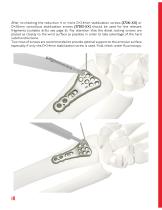
After re-checking the reduction 4 or more D=2.4mm stabilization screws (37241-XX) or D=3.0mm cancellous stabilization screws (37303-XX) should be used for the relevant fragments (suitable drills see page 6). Pay attention that the distal locking screws are placed as closely to the wrist surface as possible in order to take advantage of the hard subchondral bone. Two rows of screws are recommended to provide optimal support to the articular surface especially if only the D=2.4mm stabilization screw is used. Final check under fluoroscopy.
Abrir o catálogo na página 18Todos os catálogos e folhetos técnicos I.T.S.
-
ufs
1 Páginas
-
DHL
2 Páginas
-
ITS
2 Páginas
-
DHL - Distal Humeral Locking Plates
20 Páginas
-
PHL
24 Páginas
-
ACLS
20 Páginas
-
CFN
32 Páginas
-
OLS
24 Páginas
-
PHLs
20 Páginas
-
CTN - Cannulated Tibia Nail
28 Páginas
-
UOL - Ulna Osteotomy Locking Plate
32 Páginas
-
SR Sacral Rods
20 Páginas
-
HCS
24 Páginas
-
TOS Twist-Off Screw
20 Páginas
-
TLS
20 Páginas
-
PRS-RX
32 Páginas
-
HLS
20 Páginas
-
PLS - Pilon Locking Plates System
24 Páginas
-
ES
20 Páginas
-
SR
20 Páginas
-
FL
24 Páginas
-
PL - Pilon Locking Plate small
12 Páginas
-
PRS - Pelvic Reconstruction System
28 Páginas
-
PRL - PROlock Radius Locking Plate
20 Páginas
-
OHL - Olecranon Hook Locking Plate
24 Páginas
-
OL - Olecranon Locking Plate
24 Páginas
-
PHL - Proximal Humeral Locking Plate
28 Páginas
-
CAS
40 Páginas
-
FCN
20 Páginas
-
HOL
24 Páginas
-
FLS
24 Páginas
-
PFL
20 Páginas
-
DTL
24 Páginas
-
HTO
24 Páginas
-
PTL
32 Páginas
-
DFL
32 Páginas
-
SCL
32 Páginas
-
SLS
24 Páginas
-
CAL
20 Páginas
-
DUL
24 Páginas
-
CLS
28 Páginas









































































